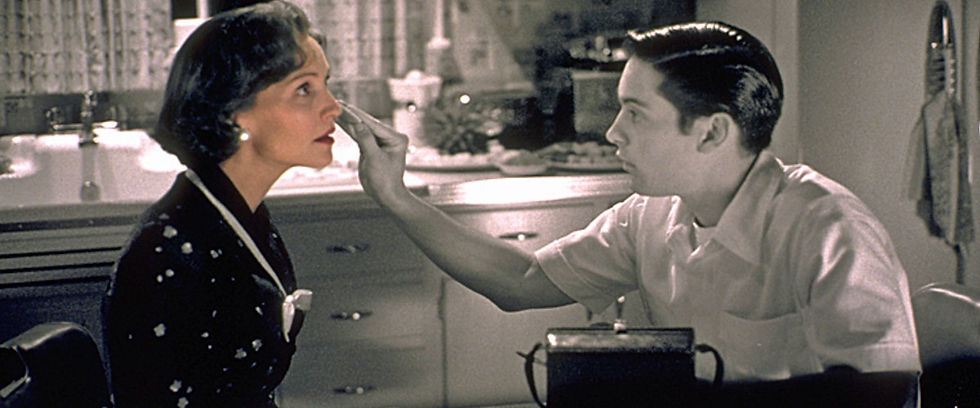Pleasantville - "Nothing is as simple as Black and White"
- Sep 26, 2018
- 4 min read
Pleasantville was made in 1998 and produced, written and directed by Gary Ross. The film was given a budget of $60 million and was praised for its visuals. The film follows the two characters of David and his twin sister Jennifer, who are transported into a black and white TV series called Pleasantville, which is set in the 1950’s. The plot then follows David and Jennifer as they attempt to add colour into the world. Upon arrival, the pre-determined world of Pleasantville is depicted as perfect in its black and white state. However, the character of Jennifer has an instant effect on the people, teaching them things about America and how the world is not always so perfect. By doing this, the black and white world begins to change into colour.
The film then shows the different perceptions of beauty as the black and white colours were seen as beautiful to the people in Pleasantville but, in contrast, David and Jennifer view it as dull and lifeless. In comparison, when the world began to turn bright and colourful, the people of Pleasantville were disgusted: seeing it as an invasion. People then begin to put signs outside of shops that read “no colours”. The people who have turned into colour are then made to believe that they are outcasts and that they should be ashamed, which is shown when Betty says “how can I go out like this?”. This indicates to the audience that the flaws in Pleasantville lead to a discovery of a fresh kind of beauty that, despite of imperfection, creates something extraordinary and beautiful.
As a way to fight back against these changes, those who dislike the colour form a group to take control of from chaos. This group takes the form of a repressive regime as it bans certain music and orders schools to only teach the history of the black and white Pleasantville. Ironically, the people who form this group are the ones that want peace, but they create even more chaos as they destroy artwork and become violent towards the colourful people. Here, the audience sees colour as a clear distinction between people as those who are unwilling to change stay black and white whilst those who become enlightened are colourful.
In one particular scene, David helps Betty Parker, who is his mother in the TV show, apply makeup to hide the fact that she has changed into colour. This is a touching part of the film as this is the first time that Betty has expressed true emotion. The audience is made to remember this as in the last scene of the movie, David is shown wiping his mother’s makeup off as she cries. This shows a connection between the two worlds as it shows that even the most perfect of things can still have imperfections.

The characters in Pleasantville are presented as being quite simple as they don’t know most things about the real world. Jennifer and David have to inform the people of Pleasantville about what happens in places like America. The people are shocked but amazed by what happens outside of Pleasantville. This makes the roles of adults and children seem reversed as the older people are the ones that should be teaching the children, like Jennifer and David, but instead it is the other way round, creating the idea that even the adults in this world act like children as they need to be taught things that you would usually be taught in school.
Meanwhile, the character of Jennifer is only truly seeing the real world for the first time, similar to the people of Pleasantville. Jennifer begins to find an interest in books and art, whereas before the only things she was worried about were boys and other peoples’ perceptions of her. The parallel here between the people of Pleasantville and Jennifer connotes the real meaning behind the film of finding yourself and finding true beauty in the world. Similarly, the people are shocked when they see colour for the first time and are truly amazed by it. By the end of the film, as the audience, having looked at black and white for the whole time, we are also amazed by the world changing colour, particularly depicted in the scene where David is driving through Pleasantville and everything around him begins to change colour.

There are also biblical references throughout the film. For example, the TV repair man, representing God, who enables Jennifer and David to enter Pleasantville sees the spread of colour across the world as ruining a perfect world. This may be a reference to the Garden of Eden that God created for humans to leave in so that they could live surrounded by perfection. Further evidence to support this is the scene where a character takes an apple from a tree and tempts David to eat it. This is also similar to the biblical story.
So, to conclude: I found that the film was very enjoyable. The representation of beauty and people’s perceptions through the film was very interesting. I would definitely recommend as it was entertaining from start to finish.
Watch the trailer to the film here:



Comments